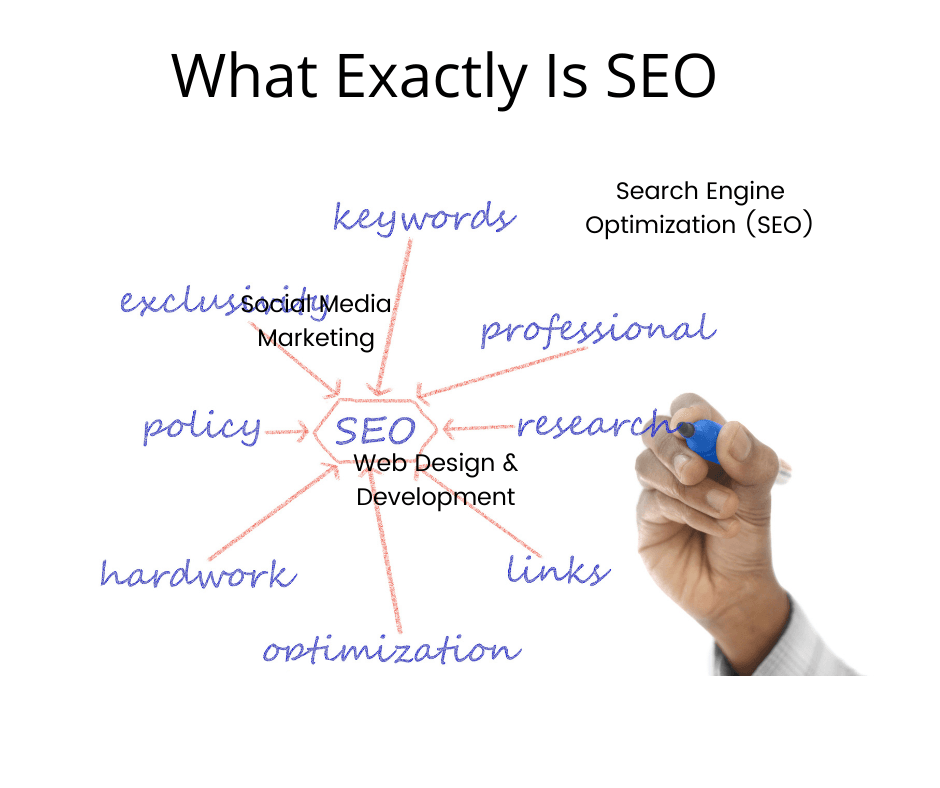In simple terms, SEO is an abbreviation for “Search Engine Optimization.” In layman’s terms, it refers to the process of improving your website so that it appears more prominently when people search for products or services related to your company on Google, Bing, Yahoo and other search engines. The higher the visibility of your pages in search results, the more likely you are to attract attention and attract new and existing customers to your company.
How does Search Engine Optimization(SEO) really work?
Bots are used by search engines such as Google and Bing to crawl web pages, going from site to site, collecting information about those pages, and indexing them. Consider the index to be a massive library where a librarian can pull up a book (or a web page) to assist you in finding exactly what you’re looking for at the time.
Following that, algorithms analyze pages in the index, taking hundreds of ranking factors or signals into account, to determine the order in which pages should appear in search results for a given query. In our library analogy, the librarian has read every book in the library and knows which one will have the answers to your questions.
Our SEO success factors can be viewed as proxy indicators for aspects of the user experience. It’s how search bots determine how well a website or web page can provide the searcher with what they’re looking for.
Unlike paid search ads, you cannot pay search engines to improve your organic search rankings, so SEO experts must put in the effort. That’s where we can help.
Our Periodic Table of SEO Factors categorizes the factors and weights them based on their overall importance to SEO. Content quality and keyword research, for example, are important factors in content optimization, and crawlability and speed are important site layout factors.
We’ve also added a new Niches section that digs deep into the SEO success factors for three key niches: local SEO, news/publishing SEO, and ecommerce SEO.
While our overall SEO Periodic Table can assist you with best practices, understanding the nuances of SEO for each of these Niches can help you succeed in search results for your small business, recipe blog, and/or online marketplace.
The search algorithms are intended to surface relevant, authoritative pages and provide users with a quick and easy search experience. Keeping these factors in mind when optimizing your site and content can help your pages rank higher in search results.
What is the significance of SEO in marketing?/ Why is SEO important for marketing?
Because people conduct trillions of searches each year, often with commercial intent to find information about products and services, SEO is a crucial component of digital marketing. Search is frequently the primary source of digital traffic for brands, supplementing other marketing channels. Greater visibility and higher ranking in search results than your competitors can have a significant impact on your bottom line.
Nevertheless, search results have evolved in recent years to provide users with more direct answers and information that is more likely to keep users on the results page rather than driving them to other websites.
Also, features in the search results such as rich results and Knowledge Panels can increase visibility and provide users with more information about your company directly in the results.
To sum up, SEO is the foundation of a well-rounded marketing ecosystem. When you understand what your website visitors want, you can apply that knowledge to your campaigns (paid and organic), website, social media properties, and more.
How can one learn SEO?
Well, While search engine optimization (SEO) isn’t a basic topic, getting started doesn’t have to be difficult or too expensive. In fact, you can submit your website’s URL here at the comment section to learn which areas to prioritize first based on its SEO.
Continue reading for six easy steps to learning SEO, or contact us online to speak with an SEO expert about our services.
1. Understand the function of Search Engines
Businesses have different marketing objectives, but they all want to increase revenue, which is really what SEO is mostly about. ”SEO” allows you to rank at the top of search engine results pages (SERPs), resulting in revenue-generating traffic.
2. Master quality keyword research
Selecting the words you want to rank for — aka keywords — necessarily requires research. You can get your site in front of a larger audience if you choose keywords that people frequently search for and that are relevant to your business.
Long-tail keywords (three or more words) and short-tail keywords (one or two words) are the two types of keywords. Long-tail keywords help to focus your pages and increase interest.
Contact us for free top keywords for your business niche.

